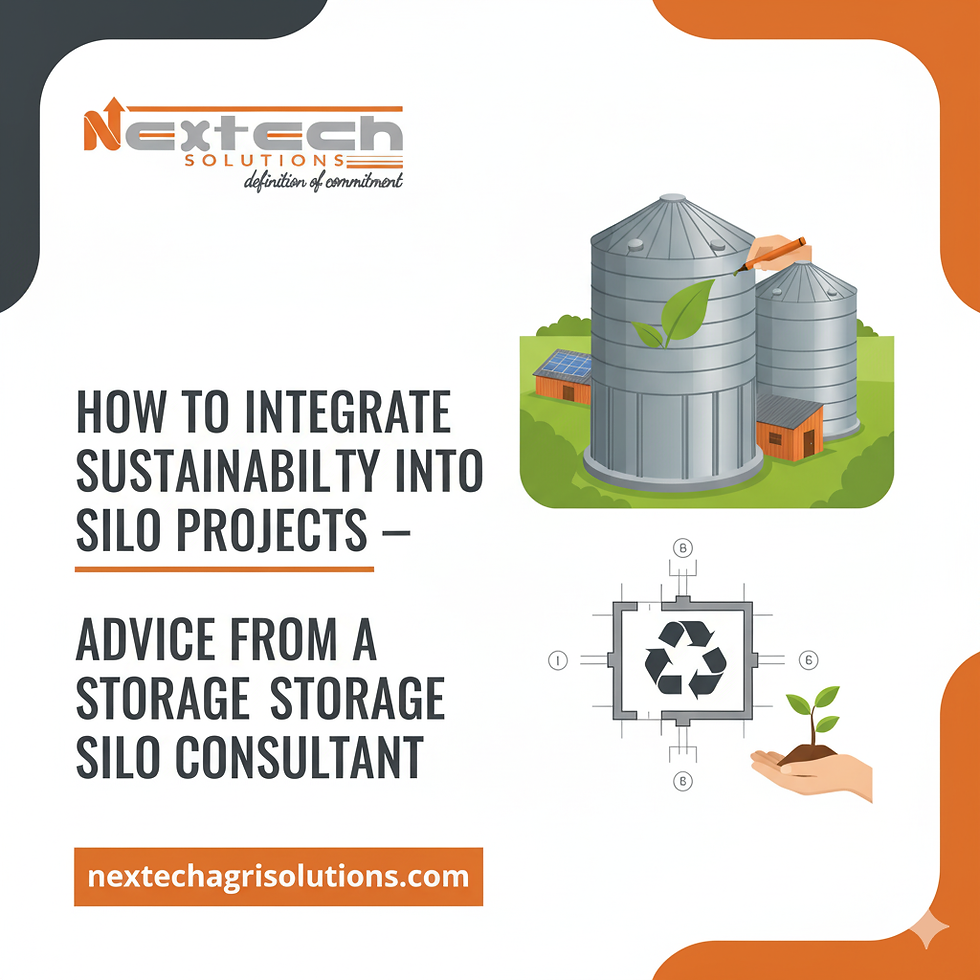How to Integrate Sustainability into Silo Projects — Advice from a Storage Silo Consultant
- S.P. Singh
- Sep 30, 2025
- 4 min read
The agricultural industry stands at a critical crossroads where tradition meets environmental responsibility. As global awareness about climate change intensifies, integrating sustainability into grain storage infrastructure isn't just an option—it's becoming essential. Whether you're planning a new facility or upgrading existing structures, a Storage Silo Consultant can guide you toward solutions that benefit both your bottom line and the planet.

Why Sustainability Matters in Modern Grain Storage
Today's agricultural businesses face mounting pressure from consumers, regulators, and investors to demonstrate environmental stewardship. Sustainable silo projects reduce operational costs while enhancing brand reputation. More importantly, they contribute to long-term food security by minimizing resource depletion and environmental degradation.
Sustainability is a hot topic; appeals to those wanting "green" projects—and for good reason. Businesses that prioritize eco-friendly infrastructure position themselves as industry leaders while securing competitive advantages in increasingly conscious markets.
Choosing Eco-Friendly Materials for Silo Construction
Material selection forms the foundation of any sustainable silo project. A seasoned Storage Silo Consultant will recommend materials that balance durability, environmental impact, and lifecycle costs.
Sustainable Material Options:
Recycled Steel: Using recycled steel for silo construction reduces mining demands and carbon emissions by up to 75% compared to virgin steel production
Low-Carbon Concrete: Modern concrete mixes incorporate industrial byproducts like fly ash, significantly lowering embodied carbon
Sustainable Coatings: Water-based, VOC-free protective coatings extend silo lifespan without releasing harmful chemicals
Locally Sourced Materials: Reducing transportation distances cuts fuel consumption and supports regional economies
Companies like Nextech Agri Solutions understand that material choices ripple through every aspect of project sustainability, from construction to decommissioning.
Energy-Saving Technologies That Transform Operations
Energy consumption represents both a major operational expense and environmental concern for grain storage facilities. Implementing energy-efficient systems delivers immediate cost savings while reducing your carbon footprint.
Key Energy-Saving Strategies:
Smart Aeration Systems: Modern temperature and moisture monitoring systems optimize fan operation, reducing electricity usage by 30-40% compared to conventional timers.
Solar Integration: Photovoltaic panels can power aeration fans, control systems, and lighting—particularly effective in agricultural settings with ample roof space and sun exposure.
LED Lighting: Switching to LED technology cuts lighting energy consumption by 60-80% while improving visibility and safety.
Variable Frequency Drives (VFDs): These devices adjust motor speeds based on actual demand, preventing energy waste during partial load operations.
A knowledgeable Storage Silo Consultant can calculate energy savings potential and recommend systems that maximize return on investment while advancing sustainability goals.
Minimizing Waste Through Intelligent Design
Waste reduction extends beyond construction materials to encompass operational efficiency and grain preservation. Every kernel lost to spoilage, pest damage, or handling represents wasted resources—water, land, fertilizer, and labor.
Waste Minimization Approaches:
Precision Storage Management: Advanced monitoring prevents quality deterioration and spoilage, protecting your investment while reducing food waste
Efficient Handling Systems: Well-designed conveyors and elevators minimize grain damage and dust generation
Modular Construction: Prefabricated components reduce on-site waste during installation and allow for future expansion without demolition
Integrated Pest Management: Structural design that prevents pest entry eliminates the need for excessive chemical treatments
For businesses involved in Grain Milling Solutions or operating a Rice Mill Business, minimizing storage losses directly impacts profitability and resource efficiency.
Reducing Your Carbon Footprint: A Comprehensive Approach
Carbon footprint reduction requires examining every phase of your silo project—from design and construction through decades of operation and eventual decommissioning.
Carbon Reduction Strategies:
Lifecycle Assessment: A Storage Silo Consultant conducts thorough carbon footprint analysis, identifying hotspots and optimization opportunities throughout the project lifecycle.
Construction Efficiency: Streamlined project management reduces equipment idling time, transportation trips, and material waste during installation.
Operational Optimization: Proper insulation, efficient aeration scheduling, and moisture management reduce energy demands for temperature control and conditioning.
Maintenance Planning: Regular maintenance prevents energy-wasting inefficiencies and extends equipment life, deferring the carbon costs of replacement.
The Business Case for Sustainable Silos
Beyond environmental benefits, sustainable silo projects deliver tangible business advantages. Energy savings compound annually, often recovering initial premium costs within 5-7 years. Enhanced grain quality preservation reduces losses and improves market value. Additionally, sustainable facilities attract environmentally conscious partners and customers while meeting increasingly stringent regulatory requirements.
Working with experienced partners like Nextech Agri Solutions ensures your project balances sustainability ambitions with practical business needs, creating infrastructure that serves both current operations and future generations.
Taking the First Step Toward Sustainable Storage
Integrating sustainability into silo projects doesn't require sacrificing functionality or profitability. Whether you're involved in Grain Milling Solutions, managing a Rice Mill Business, or operating large-scale storage facilities, expert guidance makes sustainable choices accessible and practical.
A qualified Storage Silo Consultant brings invaluable expertise in eco-friendly materials, energy-efficient systems, waste reduction strategies, and carbon footprint minimization. They transform sustainability from an abstract concept into concrete design decisions that benefit your operation, your community, and the environment.
The journey toward sustainable grain storage begins with a single conversation. By choosing advisors who prioritize both performance and environmental stewardship, you're investing in infrastructure that will serve agriculture responsibly for decades to come. The future of grain storage isn't just about capacity—it's about building systems that nourish both people and planet.


Comments